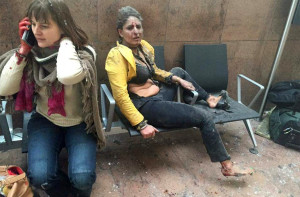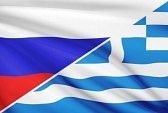Explosions at Airport and Subway Leave ‘Numerous’ Dead in Brussels
BRUSSELS — A series of deadly terrorist attacks struck Brussels on Tuesday, with two explosions at the city’s main international airport, and a third in a subway station at the heart of the city.
According to news agencies, 13 people were killed at the airport, and 15 in the subway bombing, while 30 others were wounded. Prime Minister Charles Michel of Belgium said there were “numerous” dead. “We were fearing terrorist attacks, and that has now happened,” he said. At least one of the two explosions at the airport appeared to have been set off by a suicide bomber, officials said.
The attacks, a vivid illustration of the continued threat to Europe, occurred four days after the capture on Friday of Europe’s most wanted man, Salah Abdeslam. Mr. Abdeslam is believed to be the sole survivor of the 10 men who were directly involved in the attacks that killed 130 people in and around Paris on Nov. 13.
Mr. Michel issued an extraordinary appeal to the population to “avoid all movement,” as the authorities braced for possible further attacks.
The French government ordered 1,600 extra police officers to patrol the nation’s borders, including at train stations, airports and ports. Prime Minister David Cameron of Britain called an emergency meeting of ministers.
The attacks put the Belgian capital in a state of virtual lockdown. All flights were canceled for the day. All subway, tram and bus travel was shut down. Eurostar canceled its trains connecting Brussels with Paris and London. Thalys, which runs high-speed trains linking dozens of cities in Belgium, France, Germany and the Netherlands, suspended service. Cellphone lines were jammed as panicked travelers and Belgians tried to make calls.
The events on Tuesday began with a pair of explosions at a departure hall at Brussels Airport, in the town of Zaventem, about seven miles northeast of the city center, just before 8 a.m.
“We were going to check in around 7:30 a.m.,” said one traveler, Ilaria Ruggiano. “There were seven of us. We were a bit late. We heard a big noise and saw a big flash. My mother went to the floor — she was hit. I just dropped my luggage and went to the floor. A kid came out, bleeding a lot. I tried to help him with a tissue, but it was not enough. There were two bombs.”
Another passenger, Jérôme Delanois, said he was at an Internet cafe near the Delta Air Lines counter when he heard a thunderous noise. “There were two explosions — one big one and one little one,” he said. “The first one blew all the walls and everything. There were burning flames. The first one was bigger. It blew out all the windows.”
Belinda How, a traveler from Malaysia who was in Brussels for a vacation, said she had been lining up to check in for an Etihad Airways flight when she heard the blast. “I was the last passenger queuing up,” she said. “I was very close to the first blast. Everybody was screaming.”
She added: “I said to my son — he is a Down’s syndrome special-needs child — ‘You have to run.’ He said, ‘My leg hurts.’ I think he was panicked. I left my luggage, dragged him and ran. Before I ran out, there was another bomb.”
Alan Merbaum, who had flown in from Washington, said he had narrowly avoided the blast.
“I heard what sounded like a thud a minute or so before 8 a.m.,” he said. “It sounded like it could have been something dropped off the back of a truck. Ten to 20 seconds later, I heard a loud explosion and I immediately knew what it was. I saw smoke coming out of the front entrance of the airport.”
Photographs posted online showed passengers covered in blood and soot, looking stunned but conscious. Some passengers were seen being taken away on luggage carts.
Horreur : Explosion à l'aéroport de #Zaventem: des blessés signalés, évacuation en cours . . . pic.twitter.com/kWmJVNJFWH
— Jamal Ikazban (@ikazban) March 22, 2016
Other images posted on social media showed smoke rising from a departure hall, where the windows had been blown out, and people running away from the building. Hundreds were herded outside.
https://youtu.be/-GXZw4gbU-c
Around 9:10 a.m., another blast shook the Maelbeek subway station in downtown Brussels, not far from the area that houses most of the European Union’s core institutions, according to the Belgian broadcaster RTBF. The Brussels transport authority said on Twitter that all subway stations were closing.
“We felt a boom, we felt the building tremble,” said Henk Stuten, 50, who works for the European Commission in an office above the station. “We saw through the windows that people were rushing out of the metro exit.”
About 10 to 15 minutes later, the office was evacuated, Mr. Stuten said. Some people were “very calm,” others were “very emotional,” he added.
He said most of the wounded were on Rue de la Loi, outside the station.
“There were colleagues who just five minutes before were in the metro,” he said. “You realize how close these things can come to you.”
Christian De Coninck, a spokesman for the Brussels police, told reporters near the Maelbeek subway station that several people had been killed, but he did not have a number.
Mr. De Coninck was unable to say how many blasts had taken place at the station. He appealed to everyone in the area to stay indoors to avoid getting in the way of the emergency services.
Earlier in the morning, police officers taped off the numerous streets leading to the subway station as emergency vehicles raced to the blast sites.
Ambulances were clustered around the entrance, next to the normally busy Rue de la Loi, which runs through the heart of the so-called European quarter.
A police helicopter patrolled above the station.
“For the moment, what we know is that there was at least one, possibly two explosions; we are still investigating,” said Sandra Eyschen, a spokeswoman for the Belgian federal police. “There are several injured, we don’t have any exact numbers, and, unfortunately, it appears there are some dead, at least one person.”
Belgium quickly raised its threat status to the maximum level, The Associated Press reported, citing the interior minister, Jan Jambon.
A number of flights destined for Brussels that were in the air at the time of the blasts were being diverted to other airports, said Kyla Evans, a spokeswoman for Eurocontrol, the agency that coordinates air traffic for the region.
Belgium has emerged as a focus of counterterrorism investigators after theattacks in Paris in November that left 130 people dead.
On Monday, the Belgian authorities asked for the public’s help in findingNajim Laachraoui, 24, who they identified as an accomplice of Mr. Abdeslam. The authorities are also searching for Mohamed Abrini, 31, who was filmed with Mr. Abdeslam at a gas station on a highway to Paris two days before the Nov. 13 attacks.
In: nytimes


